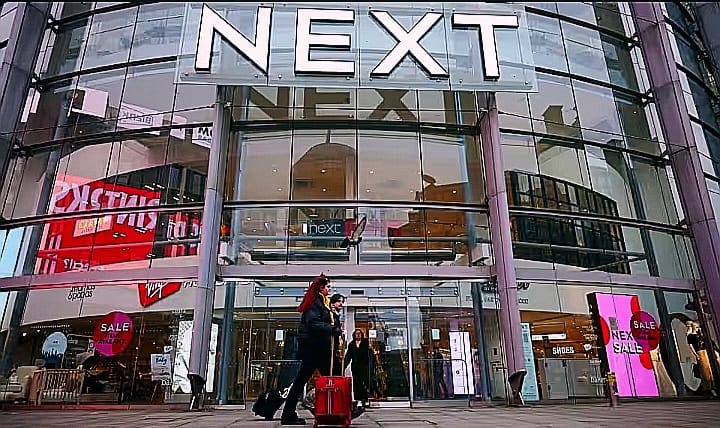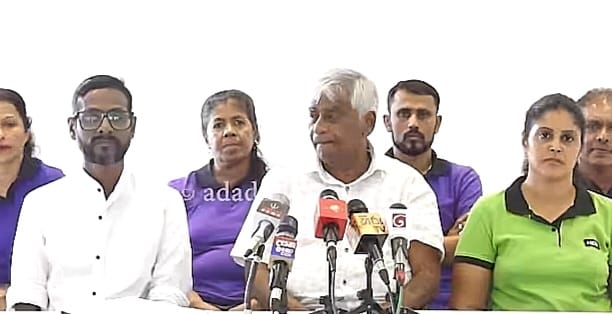NEXT in Katunayaka FTZ Lays Off 1500 Workers
Socialist Equality Party (Left)
On Monday night, management at Next Manufacturing, abruptly informed 1,416 workers at its Katunayake garment factory of the facility’s closure through a WhatsApp message. The following day, another message was sent to the dismissed employees stating that the company would make every effort to pay compensation—under its proposed package—on or before June 15.

The message warned that if workers sought redress through the Labour Commission, they would only be eligible for TEWA (Termination of Employment of Workmen Act) compensation and any other statutory payments; possibly at a later date. It also emphasized that the proposed compensation was available to both unionized and non-unionized workers.
NEXT, a British retail giant, had operated in the Katunayake Free Trade Zone since 1994. As in all other Free Trade Zones (FTZ), the vast majority of the workers employed here are oppressed rural women. These workers are often the sole breadwinners—caring for elderly parents, educating younger siblings, or raising children alone as widows. They are now turning to trade unions and the government, urging protection of their rights.
A Profitable Multinational Corporation
Next Manufacturing in Sri Lanka is a subsidiary of the UK-based multinational Next PLC—a global retail leader in clothing, footwear, beauty and home products. Headquartered in Enderby, England, Next operates approximately 700 stores worldwide.

Despite the closure of its Sri Lankan factory, Next PLC has reported soaring profits. On March 27, 2025, “The Guardian” quoted CEO Simon Wolfson as announcing a 10% rise in pre-tax profits for the fiscal year ending in January, reaching over £1 billion. Sales increased by 8.2% to £6.3 billion. Company shares surged by over 9%, and Wolfson projected profits of £1.07 billion for the coming year—£20 million above earlier estimates. He also noted that the first eight weeks of the new financial year had outperformed expectations.
Next faces challenges such as rising operating costs due to tax increases and changes to employment laws in the UK, the Financial Times says. The company expects a modest increase in sales and profits in the coming year, but it has also said that it will need to commit to efficiency improvements and strategic pricing to overcome these challenges. Accordingly, it has already closed several of its branches. The closure of Next’s Katunayake factory is in line with these proposals.
The world economy is dominated by a handful of multinational companies, which have increasingly exploited labor to maintain market dominance. They use the latest technology to do so. This costly practice has made thousands of workers laid off and factories closed in all capitalist countries, including the United States. At the same time, the capitalists are pressuring governments to impose wage cuts, social welfare cuts and stricter regulations on workers. It means that technology is not used for the convenience of the worker, but for the accumulation of wealth.
Bankrupt Trade Unionism
On the 19th, Simon Fish, a senior company official, convened a discussion with the Free Trade Zones & General Services Employees Union (FTZ&GSEU), which represents the displaced Katunayake Next workers. During the meeting, the union’s general secretary, Anton Marcus, informed the BBC Sinhala Service that the company had officially announced the closure of the factory.

Marcus has found an answer to the problems faced by NEXT. He reminded Simon Fish that, under the collective agreement between the workers and the company, consultation with trade unions is mandatory before making such a decision. ‘This is not legal. If they intend to proceed, they must obtain permission from the Labour Commissioner,’ Marcus stated. He also announced plans to seek international intervention and expressed his intention to notify unions in England, where NEXT’s parent company is headquartered.
In the same night the company fired the workers and announced that if the workers do not accept the compensation the company is offering, they are free to take any action they want. Is this the agreement Marcus reached with Fish during their discussion? Or, was Fish not interested in the free legal advice Marcus was offering? Whatever the case, what is Marcus proposing to the workers now? Anton Marcus and his union have a history of negotiating with the government and industrialists in ways that ultimately hand over workers to their employers.
Marcus strongly denies the company’s claim that the main reason for closing the garment factory is its unprofitability. NEXT owns two other factories outside the Katunayake Free Trade Zone. According to Anton Marcus, the reason those factories have not been closed is because they do not have unions. “We bargained for a salary increase. We received a raise of 4,225 rupees this year.” The company, however, seems to have learned how to control Marcus and his union. Marcus must now clarify what actions he will take without allowing himself to be controlled.
Minister of Industries Sunil Handunnetti stated in Parliament today that the trade unions have reached a collective agreement with the employers of the Katunayake NEXT factory—a type of agreement not present in other factories. He said that this agreement is what created the current issue, as it enabled the employer to lay off workers.
Investment Attraction Crisis
In a statement to Parliament, Acting Minister of Labour Mahinda Jayasinghe described the layoffs as a business decision, citing company losses of nearly $10 million since 2019. He noted that NEXT has agreed to provide compensation exceeding statutory requirements under the Termination of Employment of Workmen Act and said efforts were underway to place affected workers in other factories.
Dismissal of 1,416 workers is loss of jobs for 1,416 people. It will add up to the unemployment problem, which the government claims to be dedicated to solving. Officials are enthusiastically declaring, “it’s just one factory, there are others.” But this is not an isolated issue. The real issue is profiting concerns. The government is more focused on helping increase profits than providing jobs. The story about extraordinary compensation of up to 5 million rupees (50 lakhs) is also misleading. Compensation is given based on the length of service, and most Free Trade Zone (FTZ) workers have only worked for 2 to 5 years. Ministers’ talks on compensation of up to 50 lakhs are nothing but pitfalls aiming at cutting jobs and facilitating the bourgeoisie. Workers need jobs, not compensation.
The ruling class is facing a crisis as investors are leaving the country and are no longer attracted to invest. It is also clear that convincing them to stay longer is proving to be difficult. The Board of Investment has reported that 20 factories in free trade zones have closed as of September 30, 2022. Esquel is one of them. The company closed two Koggala FTZ factories hence cutting down 1,500 jobs.
In 2023, Brandix shut down its factories in Katunayake, Welisara, Avissawella, Rakwana, and Habaraduwa due to exchange rate issues and a decline in orders. Brandix shifted operations to low-wages countries such as Bangladesh. Workers in several other companies faced the same fate. Marcus, the Joint Secretary of the Free Trade Zones & General Services Employees Union, told newspapers that 50,000 jobs were lost in the garment sector in 2023.
Falling global demand, rising production costs, and competition from manufacturing hubs like Bangladesh have contributed to these closures. Simultaneously, the country is grappling with a debt crisis and the austerity recommendations of the International Monetary Fund. Measures such as increased electricity bills, prompted by these challenges, are raising further concerns among investors.
Government Efforts
Garment export revenue stood at USD 5 billion and 5.3 billion in 2018 and 2019 respectively. In the pandemic year of 2020, it dropped by 22% compared to 2019. Despite the economic collapse in 2021 and 2022, exports were recorded at USD 5 billion and 5.59 billion. While the bankruptcy caused a significant rise in costs, garment exports still remained at USD 4.9 billion. In 2024, the figure rose slightly to USD 5.05 billion.
During the pandemic and economic crisis, this revenue was sustained by forcing thousands to continue working under difficult conditions, laying off thousands of others, and cutting down the overtime payments and employee benefits.
What investors are demanding—and what the government is eager to deliver—is nothing less than intensified exploitation. Poverty and unemployment, the necessary conditions for this exploitation, continue unabated. Meanwhile, workers face increasing violations of their basic professional and human rights.
This is the so-called “nation-building” program the government is pushing. The recent threat to railway workers—that not a single cent will be paid to those who strike or protest—is just one example. When health graduates protested demanding jobs based on their educational qualifications, the government sent in hundreds of police to brutally suppress them.
Government top guns openly declare that trade unions must fall in line with their agenda. Even before coming to power, Lakshman Nipunaarachchi, an executive committee member of the National People’s Power, questioned the existence of trade unions, at a public meeting in Colombo on October 31. He went so far as to warn that, in future, parents would need to teach their children “what a strike is.”
The Working Class’s Independent Policy
The roots of today’s repression, exploitation, and mass layoffs do not lie solely within Sri Lanka. They are part of a wider capitalist crisis that spans over the globe. In the face of this reality, the working class must turn to its greatest weapon: international unity. Workers who have lost their jobs must now rally others—from workplace to workplace, from village to village—with the support of the broader working class. Even the smallest reform will not be handed down without a fight.
To lead this struggle, workers’ action committees must be built—independent from the traditional trade unions and pro-capitalist political movements. These committees will guide the struggle forward through mass action, including general strikes.
The Socialist Equality Party (Left) is prepared to show the way forward.
